Automobiles
Hyundai, Kia hope to turn Indians into EV consumers
In Chennai, dubbed the Detroit of Asia, Hyundai aims to overtake Maruti Suzuki to become the top car seller
By Sep 04, 2023 (Gmt+09:00)
4
Min read
Most Read
LG Chem to sell water filter business to Glenwood PE for $692 million


Kyobo Life poised to buy Japan’s SBI Group-owned savings bank


KT&G eyes overseas M&A after rejecting activist fund's offer


StockX in merger talks with Naver’s online reseller Kream


Mirae Asset to be named Korea Post’s core real estate fund operator


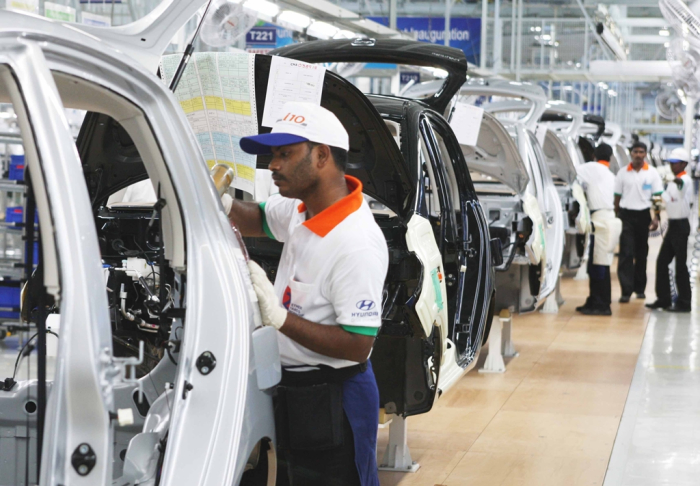
CHENNAI, INDIA – When Hyundai Motor Co. decided to establish its operations in Chennai, India, 27 years ago, many of its executives in Seoul questioned the rationale behind the risky decision.
For many global automakers, India was a tough market to crack despite its immense population. Many of its roadways were broken, rocky and uneven.
But in 1996, the South Korean carmaker established Hyundai Motor India Ltd. And a year later, it built an automaking factory in Chennai – not a joint venture with a local company but a wholly owned Hyundai company.
With a pledge to procure auto parts locally, Hyundai cleared all administrative red tape and became the first foreign carmaker to independently enter the Indian market.
Hyundai’s nearly three decades of hard work is now paying off.
Last year, India leapfrogged over Japan to become the world’s third-largest car market after China and the US. It is now also the world’s most populous nation.
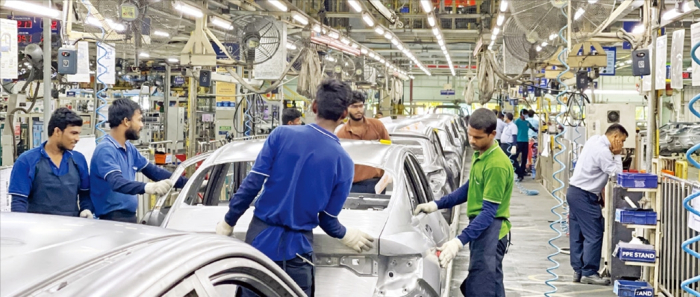
In Chennai, now dubbed the Detroit of Asia, Hyundai operates two auto plants with a combined annual production capacity of 820,000 vehicles — its largest overseas production base.
The Korean carmaker has produced 11.5 million vehicles in India since 1997 and sold more than 8 million units locally.
Even so, the South Asian country’s per-household passenger car penetration rate is less than 10%, meaning there's huge growth potential for Hyundai and other global automakers.
ACQUISITION OF GM’S TALEGAON PLANT
"This year is a significant milestone for Hyundai Motor India, as we celebrate 27 years of activity in the market,” said Kim Un-soo, chief executive of Hyundai Motor India, as he signed a deal last month to acquire GM’s Indian car manufacturing plant in Talegaon, Maharashtra state.
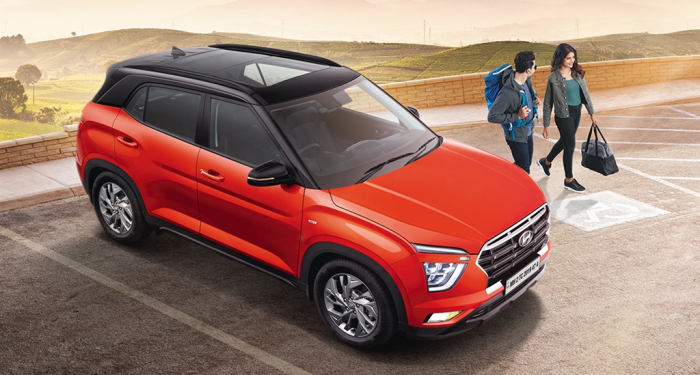
Combined with GM’s Talegaon plant, plus a planned extra investment for expansion, Hyundai expects its output capacity in India to grow to 1 million units by 2025.
As of July, Hyundai is India’s second-largest carmaker, with a 14.3% market share, trailing only Maruti Suzuki India, the local unit of Japan’s Suzuki Motor.
When combined with Hyundai’s affiliate Kia Corp., which entered the Indian market in 2019, the Korean duo’s market share stands at 20%.
“Hyundai’s brand awareness and popularity among Indian consumers rose to the top last year,” said Kim.
In May, Hyundai said it will invest 200 billion rupees ($2.45 billion) in the Indian state of Tamil Nadu over the next decade to strengthen its presence in India, which works as Hyundai’s Southeast Asian hub.
Hyundai plans to use the Talegaon factory as a base for the production of its India-dedicated electric vehicles (EVs).
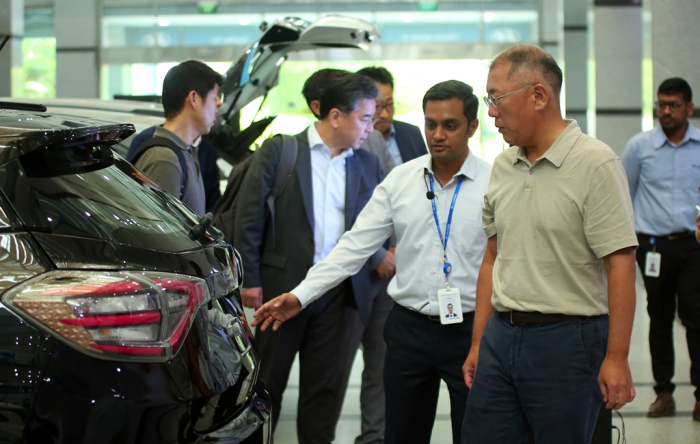
THOROUGH LOCALIZATION
Localization was the keyword for Hyundai to publicize its brand among Indian drivers in its early years of business in the country.
Hyundai’s i10 compact sedan and the Santro mini-SUV were prime examples. The two cars were affordable and built to withstand the rough and narrow road conditions in India. They instantly caught on among Indian drivers.
Now the Hyundai Creta, equipped with premium features such as LED lamps and the first-in-segment automatic transmission, has supplanted the i10 and Santro.
The mid-sized SUV Creta was named the Indian Car of the Year in 2016 and established itself as a Hyundai model that is exported to other emerging markets.
Hyundai and Kia have emerged as preferred SUV brands in India: In 2020, one in every two SUVs sold there was made by the Korean duo.
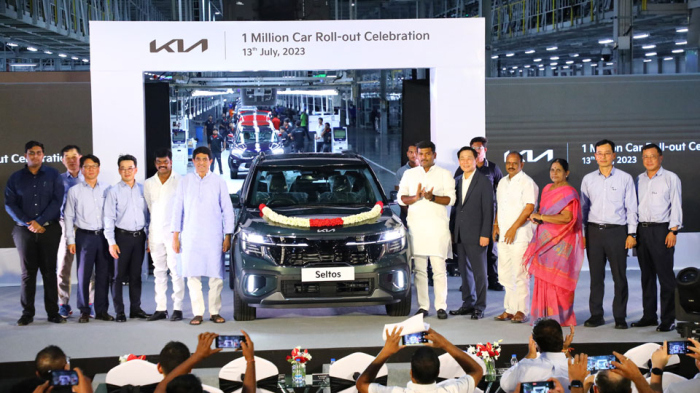
In 2021, the Hyundai Creta became the country's top-selling SUV and the seventh-highest seller among all vehicles in India. Hyundai’s small Venue SUV is also gaining a following.
Hyundai hopes its compact SUV Exter, launched in June, will be the next Creta. The model sold 7,000 units in the first month after its launch and preorders have reached 50,000 units.
The company’s plant 1 in Chennai mainly produces the Creta. The No. 2 plant there makes four models: the Exter, Aura, Nios and Creta.
With 450 robotic arms on the assembly lines of the two Indian plants, Hyundai’s hourly productivity is double that of its plants in Korea.
SECOND LEAP WITH EVs
During his visit to India last month, Hyundai Motor Group Chairman Chung Euisun said the company wants to become the first mover in the country, which is fast emerging as the next battlefield for global EV makers.
His trip to India, his first since taking the helm of Hyundai Motor Group in 2020, underscores Hyundai’s aspiration to distance itself from latecomers while striving to snatch the crown from Maruti Suzuki India, which controls 41% of India's car market.
The Indian government has vowed to ensure that EVs make up 30% of the country’s auto sales by 2030. That move has triggered EV makers from around the world, including Tesla Inc., to flock to the country with generous investment plans.
Kia, for its part, recently pledged to boost its market share in India to 10% from the current 6.7% by pushing out more models from its Indian plant in Anantapur.
Kia is also considering building a second automaking plant in India.
Write to Sungsu Bae at baebae@hankyung.com
In-Soo Nam edited this article.
More to Read
-
 AutomobilesHyundai acquires GM’s Indian plant, aims to sell more SUVs, EVs
AutomobilesHyundai acquires GM’s Indian plant, aims to sell more SUVs, EVsAug 16, 2023 (Gmt+09:00)
4 Min read -
 AutomobilesInsatiable Hyundai Motor aspires to lead India with SUVs, EVs
AutomobilesInsatiable Hyundai Motor aspires to lead India with SUVs, EVsAug 08, 2023 (Gmt+09:00)
4 Min read -
 AutomobilesKia vows to take 10% of Indian market after 1 million car output
AutomobilesKia vows to take 10% of Indian market after 1 million car outputJul 14, 2023 (Gmt+09:00)
2 Min read -
 Electric vehiclesHyundai to invest $2.45 bn in India, eyes spot in global EV top 3
Electric vehiclesHyundai to invest $2.45 bn in India, eyes spot in global EV top 3May 12, 2023 (Gmt+09:00)
3 Min read -
 AutomobilesHyundai Motor unveils new Creta at Indonesia motor show
AutomobilesHyundai Motor unveils new Creta at Indonesia motor showFeb 17, 2023 (Gmt+09:00)
1 Min read
Comment 0
LOG IN


